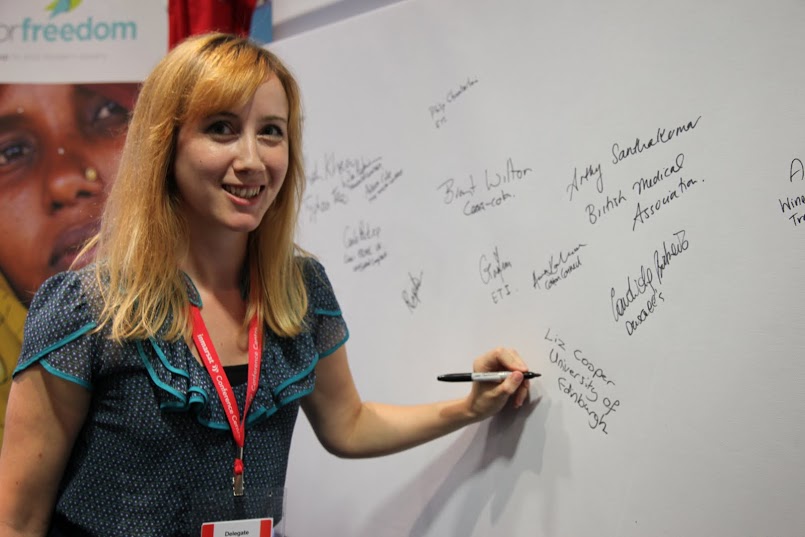Ethical Trade and Human Rights Forum

Liz Cooper reports on the Ethical Trade and Human Rights Forum which took place in London on the 19th and 20th October 2015.
On 19th and 20th October I attended the Ethical Trade and Human Rights Forum in London, organised by Innovation Forum and the Ethical Trading Initiative. I wanted to hear about key issues and the latest developments in ethical trade, to reflect on how to approach these with regards to University suppliers and supply chains. Conference delegates were largely representatives of big business, including CEOs, buyers and CSR professionals. A range of NGO representatives were also present. There was, however, a noted lack of workers from lower down global supply chains, such as factory workers, farmers, fishing workers or miners. The event was held under the Chatham House Rule – meaning I can share what was discussed, but not who made particular points.
The most talked about topic of the conference was modern slavery and forced labour, given the new UK Modern Slavery Act which comes into force this month, and the launch this week of the ILO ‘50 for freedom’ campaign. The #50ff campaign aims to persuade at least 50 countries to ratify its new Forced Labour Protocol by 2018, which takes into account new forms of slavery and addressing root causes (only Niger has ratified it so far). Presenters and delegates talked about forced labour on beef farms in Brazil, in fishing industries in Thailand, and in farming in the UK, where organised crime groups from within the EU are exploiting workers from their own countries. The issue is complex – it may not be clear whether labour is forced from someone’s working conditions, but they may have had to pay work-finding fees and other fees, and may be in debt to their employers. Others may be forced to do overtime, for example working ninety hour weeks.
In terms of what can be done to combat modern slavery and forced labour, the UK’s Gangmasters Licensing Authority aims to protect the most vulnerable workers by regulating those who oversee casual manual labour in agriculture, shellfish gathering and associated processing and packaging. The EU is currently working on a modern slavery manual. Delegates called for government procurement to lead the way in not buying from companies with forced labour in their supply chains – it was confirmed that UK government tenders now do include questions on modern slavery. The Gangmasters Licensing Authority has also been working with CIPS (Chartered Institute of Purchasing and Supply) on this issue. In Brazil, the government has rescued fifty thousand workers from slavery in recent years and a public database of companies involved has been produced, to name and shame.
The UK Modern Slavery Act is criticised by some as not being stringent enough, as it only requires companies to report on what they are doing about the issue (and so they can report that they are doing nothing). But others feel it will provide enough incentive for a race to the top in terms of company reputation. Yet it is clear there is much more to be done in terms of gaining transparency in supply chains and cracking down on exploitative practices.
Another key topic at the Forum was the Living Wage. While there is debate about which methodologies to use to calculate a Living Wage, some shocking figures were shared:
- In India, the minimum wage has been calculated to be only 28% of a Living Wage
- In Romania, the minimum wage has been calculated as 19% of a Living Wage
- In Georgia, minimum wage has been calculated as 10% of the Living Wage
- In Leicester, in the UK, illegal wages of three pounds an hour have been found in the garment sector, which is 38% of the Living Wage
Some positive examples were shared, such as the Malawian government commitment to a Living Wage for workers and a Living Income for smallholders through the Malawi 2020 Tea Revitalisation Programme, and the constitutional right to a Living Wage in Ecuador since 2008. Many agreed that the Living Wage is a human right, and that collaboration between brands, suppliers, workers, unions and governments is required.
The conference also saw discussion of the role business has in contributing to meeting the new Sustainable Development Goals, the need to look at workers’ rights in local supply chains across the world, not just in those supplying global brands, the role of unions in all countries, and the role of investors in calling for ethical trade.
The Forum concluded that all stakeholders need to be proactive in addressing injustices throughout supply chains, rather than waiting for further disasters like Rana Plaza or Morecombe Bay.






Recent comments